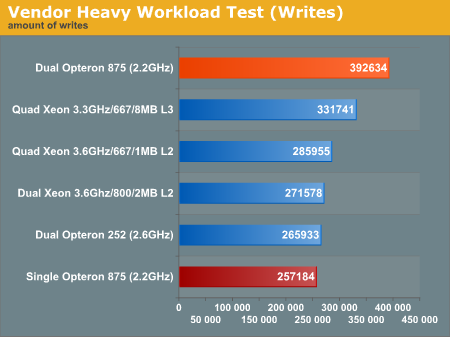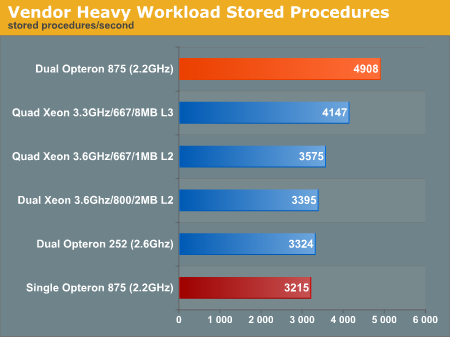AMD's dual core Opteron & Athlon 64 X2 - Server/Desktop Performance Preview
by Anand Lal Shimpi, Jason Clark & Ross Whitehead on April 21, 2005 9:25 AM EST- Posted in
- CPUs
Order Entry Results
Our Vendor test has received quite a bit of interest from certain processor vendors; rightfully so, as the workload is quite difficult to recreate.As you can see from the results below, there are some interesting conclusions that you can draw:
- The Dual Opteron 875 took the lead by 18% over the fastest Quad Intel. This should come as no surprise as we have seen in the past that the memory bandwidth limitation of the Intel FSB architecture does not allow the quads to really stretch their legs. On the other hand, the Integrated Memory Controller of the Opterons allow them to pull ahead.
- The additional L3 cache of the Quad Xeon 3.3GHz allows it to outperform the Quad Xeon 3.6GHz by 16%.
- The Quad Xeon 3.6GHz with the 667MHz FSB is only able to outperform the Dual Xeon 3.6GHz 800MHz FSB by 5%.
- The dual Xeons are able to outpace the dual 252's by 2%, and the single 875 by 5%. The Xeons success here can be attributed to the additional L2 cache.
- The Dual Opteron 875 demonstrated nice scalability by servicing 52% more requests in the same period as the single Opteron 875.













144 Comments
View All Comments
MDme - Tuesday, April 26, 2005 - link
#133i think what #130 was saying was that: from top to bottom, AMD's offerings are really good...if you want the best "bang for the buck" the 3400+ or whatever, or a 3000+ winnie OC'd will provide you with the best performance per dollar you spend...EVEN against the X2's.
On the other hand if cost is not an issue, an X2 4400+ provides extremely good performance for people willing to pay the $500 premium.
Zebo's point is in direct response to your point, which is AMD "STILL" has the best bang for the buck, not intel.
or maybe YOU missed the logic? LOL
MPE - Tuesday, April 26, 2005 - link
"Intel is just lucky a 3400+ new castle wasn't in that test suite. It's would win the majority of tests over an 830!! and it's still cheaper. Or did you miss this chart? LOL"Why not just admit it. AMD's DC is about 10-20% faster while costing 80-100% more.
Even if the 3400+ is added, that comparison is moot since if you compare the score of that to the price of AMD's own DC - the price performance ratio is stagerrring? Or did you miss that logic?
Anyways did you miss the part that even AMD DC was being beaten by their own single core.
Next.
nserra - Tuesday, April 26, 2005 - link
"The Athlon 64 4000+ was the last single core member of the Athlon 64 line.The Athlon 64 FX will continue as a single core CPU line, with the FX-57 (2.8GHz) due out later this year."
Where did you get this info anand, i am not sure if an Athlon64 X2 4400+ could not coexist with a Athlon64 4400+. If this is the last 4000+ than i must say gee thats too bad....
Zebo - Tuesday, April 26, 2005 - link
#125Techreports review is better for you. 64-bit OS, 64-bit apps when possible, no mystery unreproducable benchmarks like Anand's database stuff.
Zebo - Tuesday, April 26, 2005 - link
MPE BS, Intel is just lucky a 3400+ new castle wasn't in that test suite. It's would win the majority of tests over an 830!! and it's still cheaper. Or did you miss this chart? LOLhttp://images.anandtech.com/reviews/cpu/amd/athlon...
Intels DC chips can hardy compete with AMDs single core offerings. Side by side both DC it's a joke.
So ya, AMD still has the "best bang for the buck" top end to bottom end. And they a far on top of the mountain.
MPE - Monday, April 25, 2005 - link
Isn't the shoe on the other foot?For several years now, so many touted AMD's cheaper price and competative pricing.
Now with Pentium4 D, especially with the 3GHz model, you get half the price of the cheapest X2 while probably at best 20% lower performance?
What happened here?
Now P4D 3GHz model is the best bang for the buck and not the AMD offering. This is a complete reversal of what a lot of AMD supporters have been touting?
ceefka - Monday, April 25, 2005 - link
#125 Yeah, good point.Compare:
A. singletreaded 32-bit app on a singlecore
B. multi-threaded 64-bit app on a dualcore
Considering that multithreaded apps already see such large gains on dualcores, going 64-bit too could well mean a more than 100% improvement from A to B.
But of course, NO ONE needs dual core, 64-bit and +4GB memory in the next 5-10 years :P
The ball now lies with MS and (Linux) app developpers to write more stuff in multithreaded 64-bit code. From what I hear and read it is not so much the 64-bit part as it is the threading that is a real challenge, even for veterans.
Ross Whitehead - Sunday, April 24, 2005 - link
Visual, On P.12 I was referring to the closest Xeon competitor to the 252s which is the Quad Xeon 3.6 GHz 667 MHz FSB.Does that make any more sense?
Ross Whitehead - Sunday, April 24, 2005 - link
jvarszegi, the actual stored procs are not prefixed with "sp_", we just used that as part of the "analogy" to the real system.One could also argue that we did not prefix the analogy example with the object owner either which also incurs a cache miss.
Honestly, I have never quantified the expense of the sp_ prefix or the object owner.
Binji7 - Sunday, April 24, 2005 - link
Where are the dual-core Windows x64 and Linux x64 benchmarks?? That's what I really want to see.